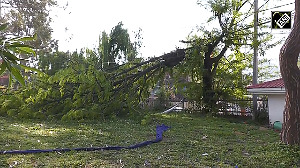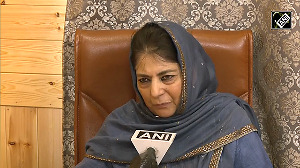Stung by the proposal to divest its marketing arm, Indian Oil Corporation is believed to have offered to acquire the government's stake in Hindustan Petroleum, a move that could easily meet the divestment target for the current financial year.
Concerned over the implication of the decision taken by the Cabinet Committee on Divestment to explore divestment of IOC's retail business, the top brass of India's sole Fortune 500 company is understood to have asked the petroleum ministry for consideration of its offer to buy out HPCL, saying it was willing to shell out Rs 10,000 crore (Rs 100 billion) for acquisition of government equity.
| |||||||||||
The company was interested in acquisition of HPCL and BPCL but had to stay out because of the government ban.
Previously, IOC had acquired the government's minority stake in Oil and Natural Gas Corp and Gail (India) Ltd as part of a cross-holding formula devised to meet divestment target.
Sources said ministries of divestment and petroleum will in the next three months explore the possibility of selling government equity in IOC. The options include splitting the country's largest firm into separate retailing and refining business units and selling the former either to HPCL and BPCL or to a third party.
IOC feels 'snatching' the retail business from it would bleed it to death.
"We acquired IBP to compliment our refining capacity. Now if the 8000 petrol stations through which IOC sells its 49.5 million tonnes of petroleum products annually, are taken away than the company is doomed," company officials said.
For IOC, which has just over 48 per cent market share, petrol and diesel retailing contributed 40 per cent of profit, while standalone refineries do not make sound commercial proposition.
Chennai and Kochi refineries which were merged with IOC and BPCL respectively as mere refining crude was not viable.
The state-of-the-art Mangalore Refineries & Petrochemical, under Aditya Birla Group, was on the verge of being declared sick mainly because it did not have the retail network to sell the 9.69 million tonnes of products produced annually.
With retail network gone, IOC may face serious problems in selling the produce of the 10 refineries it owns today that account for little over 42 per cent of the country's refining capacity, they said.
If the hived off IOC is sold to Reliance Industries or Royal Dutch/Shell, IOC products will rot as the acquirers will prefer to sell products produced from their refineries.
While Reliance would like to sell products from its 30 million tonne Jamnagar refinery, foreign players like Shell would prefer importing products from their surplus refineries in South East Asia.
Reliance, which currently does not have its own retail network, sells its products through public sector retailers, they added.







 © 2025
© 2025